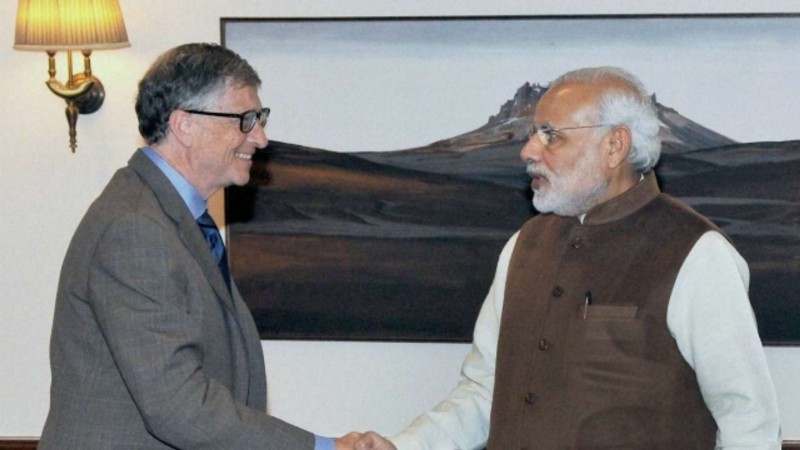As Gates Cambridge scholars and alumni, we unequivocally condemn the Bill and Melinda Gates Foundation’s decision to present the Global Goalkeeper Award to the Prime Minister of India, Narendra Modi. Lauding PM Modi for the Swachh Bharat Mission (Clean India Mission) while ignoring the gross violation of human rights under his regime is reprehensible.
Since 2014, the Modi-led regime has brazenly pursued an agenda of persecuting minorities, particularly Muslims and Dalits, damaging the democratic and secular fabric of India. In the last five years, there has been an exponential rise in hate crimes against minorities, intimidation of civil society activists, use of brute majority power to pass controversial legislation, significant dilution of the autonomy of academic and judicial institutions, and arrests and censorship of public intellectuals. The most recent illustration of this government’s espousal of Hindu nationalist ideology include withdrawal of the semi-autonomous status of Jammu and Kashmir, the only Muslim majority state in India, and proposals to effectively strip the citizenship of 1.9 million citizens, mostly Muslims, in the north-eastern state of Assam.
In an unprecedented move on 5 August 2019, the Modi-led government announced the withdrawal of the special status accorded to the disputed territory of Jammu and Kashmir. The announcement was followed by a curfew, complete clampdown on communication in the state, and arrest of democratically elected representatives. At the time of writing this letter, there are seven million Kashmiris under military siege lasting for over 40 days. Several media sources have reported on the inhuman conditions in the state, including house arrests, detentions, humiliation, and complete isolation of Kashmiris (The New York Times, The Guardian).
In Assam, on the other hand, the government has launched a bid to identify and drive out ‘illegal immigrants’ through the implementation of a National Register for Citizens, potentially rendering 1.9 million citizens stateless. This draconian measure, which would impact people who are living in poverty in flood-prone areas (Deutsche Welle), is in keeping with Home Minister Amit Shah’s proclamation that ‘immigrants’ are akin to ‘termites’ (Reuters). PM Narendra Modi continually fails to address and indeed, through his silence, abets the rise of Hindu nationalist sentiments and consequent violence against minorities in the country. Indeed, the government is emboldened by Modi’s rise to power despite the 2002 large-scale violence against Muslims in the state of Gujarat under his watch as Chief Minister.
Programmes, such as Swachh Bharat Mission, are then only diversionary tactics, reliant in large measure on media publicity rather than social change. While the Swachh Bharat Mission has been promoted through photos of PM Modi washing feet of sanitation workers, there is negligible effort to address the widespread practice of manual scavenging in the country. Indeed, the initiative perpetuates the historical reliance on the most marginalised castes to clean human excreta, sewage and septic tanks with their bare hands and bodies.
The Ramon Magasaysay Awardee and founder of Safai Karamchari Andolan (SKA or the Sanitation Workers’ Movement), Bezwada Wilson, has condemned the Swacch Bharat Mission for its disregard of institutional discrimination against Dalits and their deaths from manual scavenging. He says, ‘Toilet construction will not help us and will, in fact, push us back into manual scavenging, unless the entire exercise is mechanised and well thought out with proper planning’ (The Wire). Regardless of the debatable scope of the initiative, its promise of welfare and dignity for all is at odds with the unprecedented marginalisation of minorities under PM Modi’s government.
As Gates Cambridge scholars and alumni, with ‘commitment to improving the lives of others’, we cannot stand in silence as the Bill and Melinda Gates Foundation supports and encourages the Modi-led authoritarian regime responsible for gross human rights violations in India. By embracing Modi with the Global Goalkeeper Award, the Foundation is indeed going against its own principle that ‘all lives have equal value’. Given the current climate of violence, intimidation, and fear in India, the Foundation needs to condemn and not reward PM Modi’s leadership.
A recent petition by Stop Genocide already reached over 100,000 signatures expressing strong opposition to choosing Modi for the Global Goalkeeper Award.
Through this letter, we add our voices to this opposition and call upon the Foundation to revoke the award, allowing us to continue to take pride in Bill and Melinda Gates Foundation’s work for the improvement of living conditions and the promotion of human rights for all across the world.
- Divya Venkatesh, PhD Pathology, 2011–16, Queens’ College
- Sagnik Dutta, PhD Politics and International Studies, 2016–2020
- Ananya Mishra, MPhil Modern South Asian Studies, 2014–2015; PhD English, 2016–2020, Corpus Christi College
- Draško Kašćelan, PhD Linguistics, 2015–2019
- Asiya Islam, PhD Sociology, 2015–2019; Junior Research Fellow, Newnham College
- Arif Naveed, PhD Education 2014–18, Lecturer, University of Bath, UK
- Callie Vandewiele, PhD Latin American Studies 2014–2018; Lecturer, University of Auckland
- Dena Qaddumi, PhD Architecture, 2016–2020
- Stephanie Gabriela Lopez, MPhil Latin American Studies 2014–2015
- Reetika Subramanian, PhD in Multi-disciplinary Gender Studies 2019–22, Queens’ College, University of Cambridge
- Peter Sutoris, PhD Education, 2015–2019, Clare Hall College
- Berenice Guyot-Rechard, PhD History, 2009–2013, Trinity College
- Maria Hengeveld, PhD Development Studies -2017–20 King’s College
- Safwan Aziz Khan, MPhil Public Policy, 2016–17, Christ’s College
- Joshua Feinzig, MPhil Criminology, 2016–2017, Pembroke College
- Surabhi Ranganathan, PhD Law 2008–2012; University Lecturer, King’s College
- Sheina Lew-Levy, PhD Psychology, King’s College; Postdoctoral researcher, Simon Fraser University
- Nayanika Mathur, PhD Social Anthropology 2005–2010, Associate Professor in the Anthropology of South Asia, University of Oxford
- Gregory Wilsenach, PhD Mathematical Logic, 2014–2018, Postdoctoral researcher, University of Cambridge
- Njoki Wamai, PhD Politics and International Studies 2012–2016; Assistant Professor, United States International University — Africa
- Tariq Desai, PhD Genetics 2014–2019, Magdalene College
- Juliana Broad, MPhil History and Philosophy of Science 2018–2019, Darwin College
- Rebecca Love, PhD Medical Science, 2015–2019, King’s College
- Margaret Comer, PhD Archaeology, 2015–2019, Jesus College; Postdoctoral Researcher, University of Cambridge
- Caitlin Casey, PhD Astronomy, 2007–2010, St John’s College; Professor at University of Texas at Austin
- Marina Veličković, PhD Law 2017–2020, Pembroke College
- Nicholas Barber, PhD Earth Science, 2018–2022, Churchill College
- Solange Manche, PhD French, 2018–2021, King’s College
- Elizabeth Walsh, MPhil Social Anthropology, 2015–2016, King’s College
- Monica Petrescu, MPhil Economics, 2011–2012
- Zoe Stewart, PhD Clinical Biochemistry, 2014–2018, Clare College; Academic Clinical Lecturer, University of Leicester
- Collin VanBuren, PhD Earth Sciences, 2013–2017, Christ’s College; Postdoctoral Researcher, the Ohio State University
- Anjali B Datta, PhD History, 2009–2014, Trinity College
- Ana Maria Guay, MPhil Classics, 2015–2016, Newnham College
- Zenobia Ismail, PhD Politics 2013–2017, Wolfson College
- Annalise Higgins, PhD History, 2016–2020, Trinity College
- Hanna Danbolt Ajer, MPhil Theoretical and Applied Linguistics 2014–2015, PhD Linguistics 2015-present, Trinity Hall
- Justin G. Park, MPhil Anglo-Saxon, Norse and Celtic Studies, 2013–2014, Wolfson College
- Bhaskaran Nair, PhD Materials Science 2014–2019, Trinity College
- Aliya Khalid, PhD Education 2015–2019, Newnham College
- Cansu Karabiyik, PhD Medical Science, 2016–2020, Pembroke College
- Nandini Chatterjee, PhD History, 2002–2007, St Catharine’s College
- Neha Kinariwalla, MPhil Modern Society & Global Transformations 2014–2015, King’s College
- Paulo Savaget, PhD in Engineering, 2015–2019, Hughes Hall
- Akhila Denduluri, PhD Chemistry, 2017–2021, Murray Edwards College
- Minaam Abbas, MB/PhD Medicine and Pathology, 2017–2020, St. John’s College
- Sara Kazmi, PhD English, 2017–2021 Queens College
- Eddie Cano Gamez, PhD Biological Science, 2017–2020, Selwyn College
- Elinor Lieber, PhD Criminology, 2018–2021, Pembroke College
- Julia Bolotina, MPhil & PhD Anglo-Saxon, Norse and Celtic, 2011–2016, St John’s College
- Saba Sharma, PhD Geography, 2015–19
- Lena Dorfschmidt, PhD Psychiatry, 2018–2021, Darwin College
- Noor Shahzad, MPhil Modern South Asian Studies, 2016–2017, Christ’s College
- Leor Zmigrod, PhD Psychology 2016–2019, Downing College; Junior Research Fellow, Churchill College
- Hanna Baumann, PhD Architecture, 2012–17, King’s College
- Darinee Alagirisamy, MPhil Modern South Asian Studies, 2011–2012, PhD History, Lucy Cavendish
- Michael Pashkevich, PhD Zoology, 2017–2021, Jesus College
- Dino Kadich, MPhil Geographical Research 2018–19 and PhD Geography 2019–2023, Emmanuel College
- Dorien Braam, PhD Veterinary Medicine, 2018–2021, St John’s College
- Anija Dokter, PhD Music 2012–18, Queens’ College
- Edyth Parker, PhD Veterinary Medicine, 2016-, Clare College



Leave a Reply